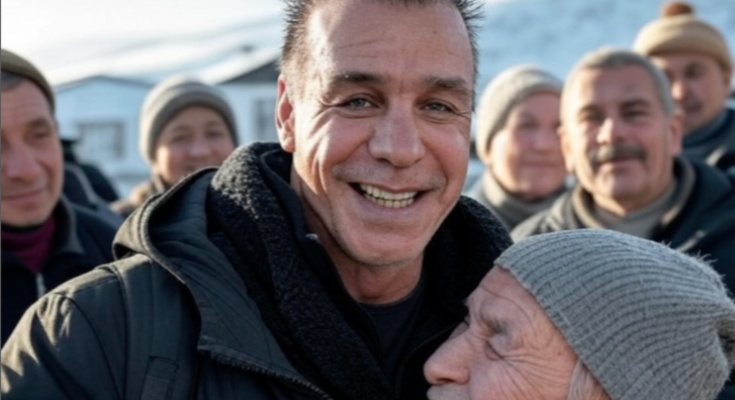In a remarkable twist of fate, Till Lindemann, the iconic frontman of the German industrial metal band Rammstein, recently embarked on a journey that bridged continents and cultures. His visit to the village of Çiğdemli in Erzurum, Turkey, was not just a touristic endeavor but a deeply personal pilgrimage to reconnect with his ancestral roots. This journey was inspired by a DNA test conducted over two decades ago, which revealed that Lindemann has partial Turkish heritage, with ancestors hailing from this very village.
The revelation of his Turkish lineage came as a surprise to many, including Lindemann himself. In 2004, a DNA test uncovered that his paternal ancestry traced back to Çiğdemli, a village nestled in the Aziziye district of Erzurum. This discovery was more than just a genealogical fact; it was a revelation that added a new layer to his identity and heritage. It also inspired Lindemann to incorporate elements of Turkish culture into his music, most notably in Rammstein’s 2005 album, “Rosenrot,” where the song “Zerstören” features a sample of “Huma Kuşu,” a Turkish folk song performed by Devrim Kaya.
Despite the initial revelation, it took Lindemann nearly two decades to visit Çiğdemli and meet his distant relatives. In early 2025, he finally made the journey, arriving in the village to a warm and heartfelt welcome. The villagers greeted him with traditional Turkish instruments, such as the davul and zurna, creating a festive atmosphere that celebrated the reunion of family and heritage. Lindemann’s arrival was met with excitement and curiosity, as many villagers had heard of the famous musician but never imagined a connection to him.
One of the most touching moments of the visit occurred when a 102-year-old villager, upon hearing German spoken in the village square, became alarmed and shouted, “What’s happening? Is this a German invasion?” The misunderstanding was quickly resolved, with Lindemann lightheartedly embracing the elderly man and quipping, “If there were an invasion, you’d defend this village on your own, my uncle.” This exchange not only highlighted the warmth and humor of the encounter but also underscored the deep bonds of family and community that transcended borders and generations.
Lindemann’s visit to Çiğdemli was not just about tracing his lineage; it was about building bridges between cultures and fostering a sense of belonging. In a world often divided by differences, his journey serves as a reminder of the shared humanity that connects us all. It also emphasizes the importance of understanding and embracing one’s heritage, as it can lead to profound personal growth and meaningful connections.
As Lindemann departed Çiğdemli for a planned ski trip in Palandöken, he expressed his intention to return. He promised to visit again after his upcoming concert in Istanbul on December 6, 2025, signaling that this was not a one-time visit but the beginning of a deeper relationship with his Turkish roots. This commitment reflects his genuine desire to stay connected with his heritage and family, ensuring that the ties forged during this visit would continue to grow and strengthen.
This story of rediscovery and reunion has resonated with many, sparking conversations about identity, heritage, and the power of family. It serves as an inspiration for others to explore their own genealogical backgrounds and reconnect with their roots. In a time when the world feels increasingly fragmented, Lindemann’s journey reminds us of the importance of embracing our histories and the connections that bind us together.
As we reflect on this remarkable journey, we invite you to share your thoughts and experiences. Have you ever discovered unexpected aspects of your heritage? How has your ancestry influenced your identity? We encourage you to leave a comment below and engage in this conversation. Your stories and perspectives enrich this discussion and help build a community united by shared experiences and mutual respect.
In conclusion, Till Lindemann’s visit to Çiğdemli is more than just a personal story; it is a testament to the enduring power of family, heritage, and the human connection. It reminds us that no matter where we come from, we all share a common thread that ties us to our past and to each other. As we continue to navigate a complex and often divided world, stories like Lindemann’s offer a beacon of hope and a reminder of the bonds that unite us all.
We look forward to hearing your thoughts and stories. Please feel free to comment below and join the conversation.



